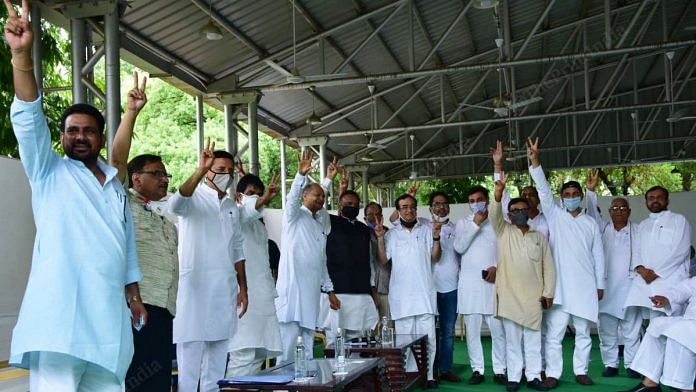New Delhi: The Rajasthan High Court Monday dismissed a petition filed by BJP MLA Madan Dilawar, challenging assembly Speaker C.P. Joshi’s inaction on the disqualification proceedings against the six BSP MLAs who had merged with the Congress.
Dilawar told ThePrint that the petition was dismissed because Joshi took a decision Friday, refusing to disqualify the BSP MLAs. He has, therefore, now decided to challenge the Speaker’s order.
“I had filed the petition that the Speaker was not acting on the petition that was filed a few months back. The petition has been dismissed by the high court as the Speaker has decided on the matter,” the MLA for Ramganj Mandi said.
“However, I will once again approach the court on the merit of the Speaker’s judgment. I am not satisfied with the response of the Speaker and the petition will challenge his verdict,” Dilawar said.
ThePrint examines the legal position of the six MLAs’ merger with the Congress according to the Tenth Schedule of the Constitution.
Also read: Why Rajyavardhan Rathore is missing from Rajasthan BJP’s fight to dislodge Gehlot govt
The merger
BSP MLAs Rajendra Gudha, Lakhan Meena, Deepchand Kheria, Sandeep Yadav, J.S. Awana and Wajib Ali had last year declared that they had merged with the Congress, and Speaker Joshi is understood to have accepted the merger in September last year.
On 26 July, the BSP issued a whip to these six MLAs, telling them to vote against the Congress in case there is a floor test. It also refused to accept their merger with the Congress and termed it illegal. The six MLAs are crucial to Rajasthan Chief Minister Ashok Gehlot’s number strength in the assembly.
However, both the BSP and the BJP contended that since former is a national party, there cannot be any such merger at the state level, unless there is a merger of the BSP and the Congress at the national level.
What does the law say?
The anti-defection law, enshrined in the Tenth Schedule of the Constitution of India, was inserted in 1985 to prevent political defections.
It lists two situations for disqualification on the ground of defection — the first is if an MP or an MLA “has voluntarily given up his membership of such political party” [clause 2(1)(a)], or second, if he/she votes or abstains from voting in the house contrary to any direction issued by his party, that is if he violates the party whip in the house [clause 2(1)(b)].
However, the Tenth Schedule lists one instance where the legislators can change their party without risking disqualification — paragraph 4 allows a party to merge with or into another party, provided that at least two-thirds of its legislators are in favour of the merger. In such a scenario, neither the members who decide to merge, nor the ones who stay with the original party, will face disqualification.
Also read: Rajasthan governor hits back at Gehlot, asks why trust vote needed when he claims majority
‘Original parties need to merge’
Former Lok Sabha secretary general and constitutional expert P.D.T. Achary favoured the BSP argument, asserting that merger under the anti-defection law “can take place only between two original political parties”.
He explained: “There are two conditions that need to be fulfilled. One is that there should be a merger between two original political parties. And then subsequently, 2/3rds of the members of that House belonging to that party should accept it. If 2/3rd of the members do not accept it, then the merger doesn’t happen as per the law.
Achary added: “The law has been made difficult, so that ambitious members do not break up the party, because the anti-defection law basically aims at protecting the party system and not just at curbing defection.”
Another former Lok Sabha secretary general, Subhash C. Kashyap, agreed, saying: “For a merger, the party which sets up candidates for the election is the party which has to merge. According to the Tenth Schedule, it is the party which is authorised to set up candidates which has to merge. And one of the requirements for this is that 2/3rd MLAs of that party should agree to the merger.
Kashyap added: “So legally, it is only one of the requirements. It is not that 2/3rd members of a national party at the state level can merge.”
‘BSP trying to delay the process’
However, constitutional expert Faizan Mustafa disagreed with this position. He called the BSP’s argument “interesting”, but said that “this would mean that the legislative party will not have any right to merge with anybody in any state”.
Mustafa referred to the definitions of ‘house’ and ‘legislature party’ under the Tenth Schedule, and pointed out that a ‘legislature party’ is defined as a ‘group consisting of all the members of that house’.
Pointing out the usage of these terms in Paragraph 4 of the Tenth Schedule, he then asserted that the merger has to be seen “locally” and not at the national level, as has been argued by BSP.
Mustafa also pointed out that nowhere does the Tenth Schedule talk about how a ‘national party’ should split or a ‘regional party’ should split.
He also referred to past instances where mergers had taken place, saying: “Congress MLAs in Goa too have switched over like this — 10 of 15 had defected to BJP. Last year, 12 Congress MLAs had merged with TRS in Telangana.”
Therefore, he said, “the BSP is now trying to delay this process and the filing of this petition is intended to help the BJP”.
Also read: CP Joshi — Rajasthan speaker, Gandhi-loyalist & ‘massive failure’ as in-charge of 10 states



